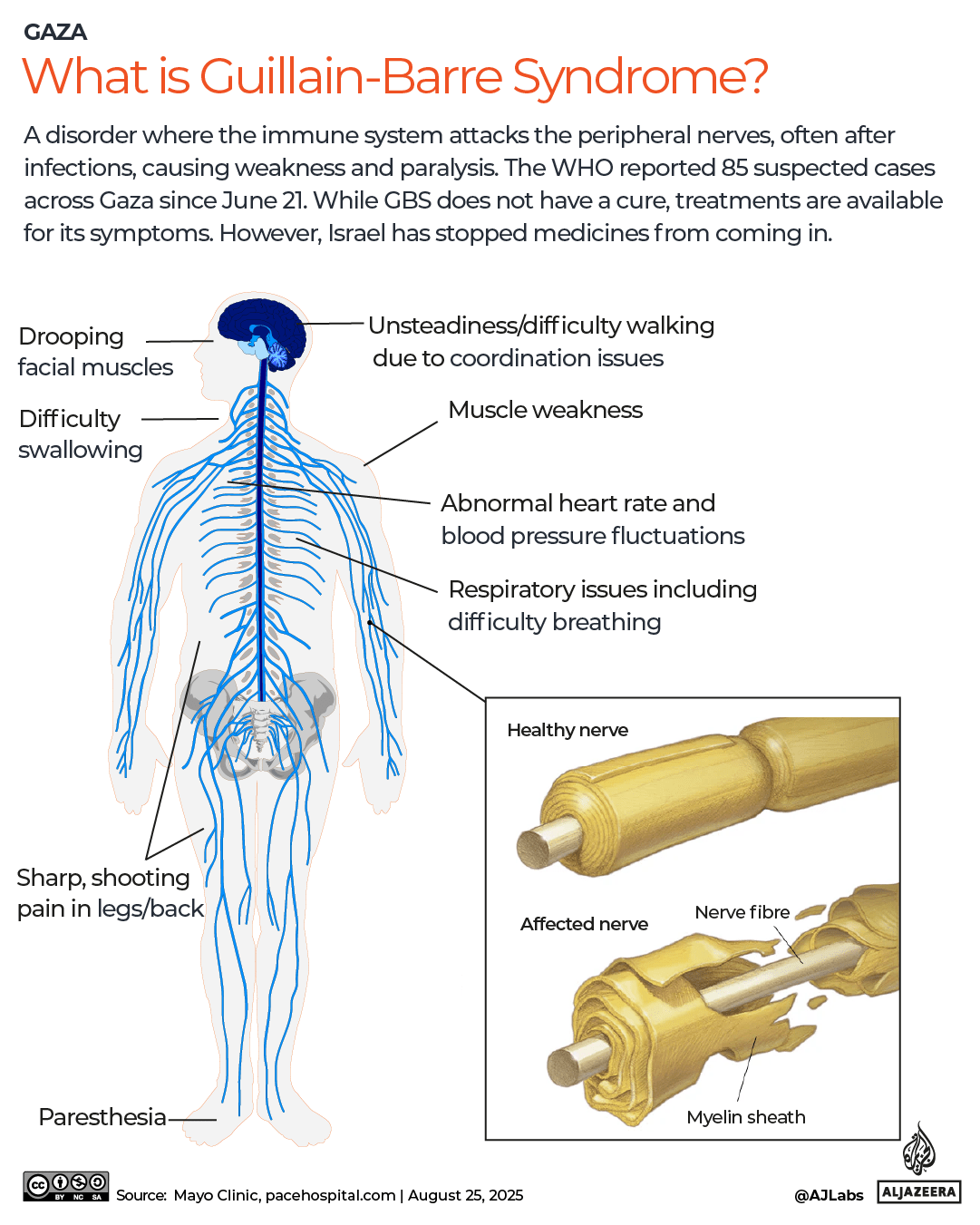As a result of an Israeli blockade that continues to prevent the entry of food and medicine into Gaza, paralytic diseases are becoming more prevalent.
According to the World Health Organization (WHO), 85 cases of Guillain-Barre syndrome (GBS) have been reported since June.
Eight deaths have been linked to GBS in Gaza, according to the WHO.
Guillain-Barre syndrome: what is it?
The myelin sheath, which protects the peripheral nerves, is attacked by the body’s immune system as a result of GBS.
The nerve fiber is exposed, which leads to nerve damage.
From the brain and spinal cord, peripheral nerves travel through body parts like the skin, muscles, and organs.
According to the website of the Cleveland Clinic, GBS is a very uncommon condition that affects about 100,000 people worldwide annually.
Why does one get GBS?
GBS typically affects people who have had an infection from a viral or bacterial infection like the flu, Epstein-Barr virus, or Zika virus, despite the absence of an exact cause.
One of the most prevalent risk factors for GBS is a gastroenteritis brought on by the Campylobacter jejuni bacteria, according to the WHO. Animal faeces frequently contain Campylobacter jejuni.
According to Dr. Ahmed al-Farra, head of paediatrics at the Nasser Medical Complex in Khan Younis, the majority of lab testing samples in Gaza have come back positive for Campylobacter jejuni, The Independent reported on Saturday.
According to Al-Farra, samples also turned out to be positive for enterovirus, a class of viruses that typically spread to people through contaminated water and cause body aches, sore throats, and rashes.
He explained that Israel’s failure to shut down Gaza’s sewage system, forcing residents to drink sewage-contaminated water, contributed to this disease spreading.
Global advocacy group Oxfam reported in July 2024 that Israeli bombardment destroyed 70% of all sewage pumps and wastewater treatment plants in Gaza. Israel has also accused Oxfam of enforcing restrictions on access to Oxfam’s water testing equipment.
GBS may also occasionally be brought on by surgery.
What signs indicate GBS?
Depending on the severity of the illness, symptoms can vary.
GBS typically starts with the feet and legs tingling, feeling numb, or having muscle weakness, before moving on to the rest of the body.
Other symptoms include muscle pain in the back or legs, chest pain that can cause breathing difficulties, eye movement difficulties, and swallowing or speaking problems.
Extremely frequently, legs or even the entire body can become paralyzed. Additionally, it can cause numbness, pricking, burning, or chilling of the skin.
According to the WHO, symptoms can last for a few weeks, and most people recover without developing long-lasting neurological problems. Some people still have weakness, though.
A small percentage of patients die from complications like cardiac arrest, blood infections, pulmonary embolism, or paralysis of the respiratory muscles, which can be life-threatening.
How is GBS diagnosed?
by tying the disease to the symptoms of the patient.
GBS symptoms overlap with those of other illnesses, so tests are necessary to support a diagnosis.
A small amount of fluid is injected into the lower back spinal canal to cause a lumbar puncture.
This fluid has been subjected to a GBS-compatible change test.
Electromyography, a muscle-based test that measures nerve activity, is another option.
What is the outcome?
GBS has no known cure, but there are ways to treat it.
For instance, a patient is placed on a ventilator if they are having breathing difficulties. Rehabilitation exercises can be helpful if a patient is struggling with their muscles.
Immunotherapy is used to treat early symptoms because GBS is an autoimmune condition.
This includes blood-transfer, which removes antibodies from the plasma. Within a few weeks of symptoms developing, these treatments are most potent.
Patients are hospitalized and monitored for complications because GBS is a life-threatening illness.
Are other conditions in Gaza causing paralysis?
While paralysis is also a common disease in Gaza, GBS is not the only one that is spreading.
Acute flaccid paralysis (AFP), a condition that causes muscle weakness or paralysis, has recently increased in Gaza.
The Palestinian Health Ministry in Gaza issued a press release on August 4th, citing a dangerous increase in cases of acute flaccid paralysis and Guillain-Barre syndrome among children in the Gaza Strip as a result of atypical infections and worsening acute malnutrition.
According to the press release, “Medical examinations have revealed the presence of intestinal viruses other than polio,” confirming the existence of a fertile environment for the unchecked spread of infectious diseases.
Paralysis is also brought on by the poliovirus, which had been eradicated from Gaza for 25 years.
11 months after Israel’s occupation of the enclave, it reappeared in Gaza.
It affects children under five years old primarily because it is caused by a particular type of enterovirus.
Gaza struggles with famine, so there are no medications there.
As a result of the Israeli blockade, Gaza is suffering from a man-made famine and a severe lack of medication.
Gaza is currently facing a level 5 catastrophe, according to the Integrated Food Security Phase Classification (IPC) report. “Starvation, death, destitution, and extremely critical acute malnutrition are evident,” the report states.
Israel imposed a total blockade on essential supplies in mid-March, including fuel, food, and water. Although the supply chain has officially been re-established, supplies are haphazardly and only available now.
The UN reported on August 13 that Gaza’s hospitals were overcrowded.
Less than half of Gaza’s hospitals and 38 percent of its primary healthcare facilities are partially operational or only partially functioning, according to Dr. Rik Peeperkorn, WHO’s representative for the West Bank and Gaza Strip.
Additionally, the UN reported that major hospitals’ bed numbers are far beyond capacity.
Source: Aljazeera

Leave a Reply